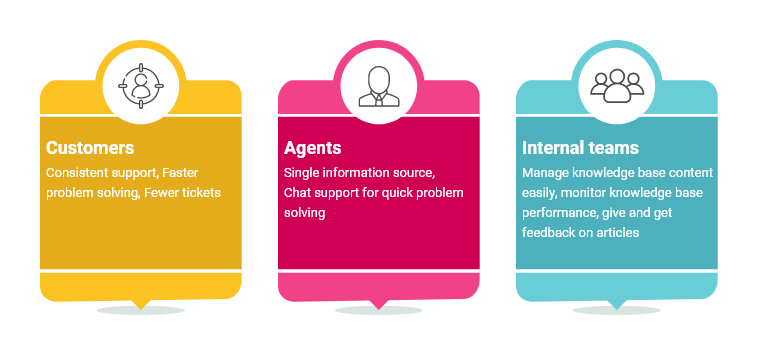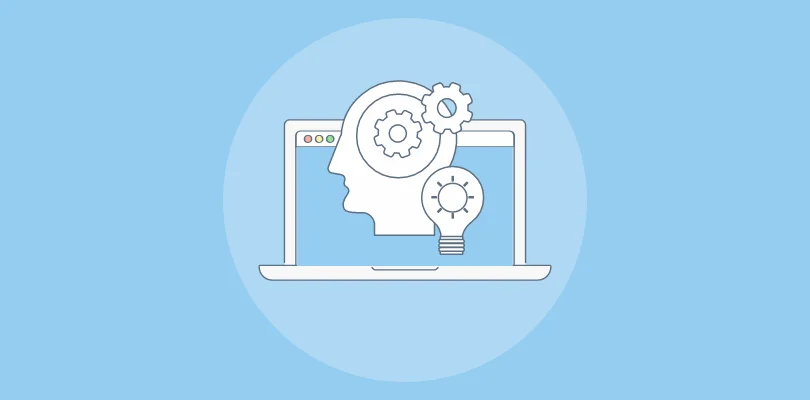
Gone are the days when product and price dictated a company’s success.
89% of companies today compete solely on the basis of customer experience.
In this digital world, customers are in the driving seat, you need to pivot towards crafting exceptional experiences to stand strong with your heads held high.
What if you don’t work on customer experience?
Remember the United Airlines incident that happened last year? One negative experience went viral, and the company’s value was reduced by $1.4 billion overnight. That’s how catastrophic poor customer experiences can be.
What if we told you there is an easy and effective way to build positive experiences and win customer confidence?
Today’s customers want frictionless experiences while interacting with a brand, and a knowledge management system helps you provide just that. It consolidates your business knowledge on a centralized, easily accessible platform, taking help closer to your customers.
Get the Best Knowledge Management System for Your Customers
This blog explains everything you should know about the role of knowledge management in improving customer experience. But, before that, let’s understand:
- How customer experience affects purchase decisions?
- Customer support and customer experience – What’s the connection?
- Customer support without knowledge management – Major challenges
- How Knowledge Management System (KMS) Improves Customer Experience?
How Customer Experience Affects Purchase Decisions
Today, the term ‘customer experience’ (CX) gets a lot more attention than it did some years ago. With customers’ elevated expectations for great experiences, CX is now considered a critical business strategy by small startups as well as global enterprises.
But, the fact remains that most companies give lip service to customer experience. Only those brands that realize the crucial role CX plays in influencing buying decisions tend to stay laser-focused on crafting exceptional customer experiences.
The experience customers receive while interacting with a brand influences them to a large extent in making purchase decisions, eventually leading to higher sales. That’s what’s important in the end. Isn’t it?
A good experience instantly makes customers feel positive about your brand. This positivity reflects in their purchase decisions and future brand interactions. They willingly spread good words about their experiences in their social circle, and over time become ardent supporters of your brand.
What happens next?
You get repeat customers, repeat purchases, and higher sales!
84% of companies witnessed an increase in revenue following positive customer experiences.
Let’s now move to the other end of the spectrum, wherein you don’t succeed in your attempt to deliver impeccable experiences.
Customers’ impulse to punish bad customer experience is stronger than their urge to reward good experiences. A single bad experience can turn the tables against you, with customers admonishing your brand on social media.
The result?
Poor brand image reduced customer loyalty and decreased sales.
This amounts to a loss of a whopping $537 billion in the United States!
This gives a clear picture of how customer experience influences buying decisions and has the power to boost or hinder your business growth.
Customer Support & Customer Experience – What’s the Connection?
Customer support and customer experience are considered almost the same. But, are they really similar?
Not exactly!
Both these are different terms with different meanings. Customer support refers to the assistance and advice you provide to your customers, with the objective to help them use your products or services successfully.
Customer support is a small but significant part of the overall customer experience. It gives customers what they need when they need it, and how they need it. Customer support helps you win customer trust and position yourself as a customer-centric brand.
On the other hand, customer experience is a broader concept. It involves the whole customer journey, right from the time customers walk in as visitors and browse through your offerings till they purchase and start using your product.
While customer experience focuses on everything from pre-purchase to post-purchase, customer support is all about the customer interactions directed towards solving challenges and addressing concerns.
Customer Support Without Knowledge Management – Major Challenges
Before coming to how knowledge management can take your customer support, and by that extension, your customer experience, to a whole new level, let’s dive into the challenges faced when you don’t have a knowledge management system in place.
More and more companies today are trying to stay intensely focused on customer experience, but there are a few hindrances that often come in the way. This is especially true for companies that haven’t employed knowledge management.
These are some of the key challenges that your customer support team might face if you don’t have a knowledge management system –
Lack of instant access to valuable information
This hinders your team from providing accurate and timely support services to customers.
Poor resolution time
Your support team has to go through countless files and folders and scour for information. This is a time-consuming process and can increase the response time significantly.
Poor customer onboarding
Without a knowledge management system, onboarding customers becomes a daunting task. Poor onboarding experience leads to dissatisfied customers who might leave your brand for a superior quality experience.
Knowledge silos
A knowledge management system makes knowledge-sharing across departments seamless. Without a proper system in place, your support team can get isolated from important business knowledge, hitting their ability to deliver a great support experience.
In a nutshell, the absence of customer knowledge management can play against you by making your support process inefficient, bumpy, and flawed.
The result?
Dissatisfied customers who no longer want to stay with you!
You will not want that to happen, right?
It’s time to learn how a powerful knowledge management system improves customer experience.
How Knowledge Management System (KMS) Improves Customer Experience?
An intuitive knowledge management system can streamline your customer experience process.
It works on a simple model. You can store all your business knowledge on a centralized cloud platform i.e., a knowledge base that agents can use to quickly address customer concerns. While it helps agents serve your customers better, it also allows your customers to self-serve. This means customers can use it for problem-solving, without completely depending on your support staff.
Here’s how embracing knowledge management can improve your customer experience:
1. Allows Customers to Self-Serve
A knowledge management system allows customers to conquer any challenges they encounter while using your product without seeking assistance from your support team.
It makes them self-reliant, confident, and above all, independent as far as problem-solving is concerned.
Modern customers crave self-service. Give them what they need, and you will be amazed by the way it impacts the customer experience.
Related Read: Self-Service Customer Support Guide
Here are some major benefits of equipping your customers with a KMS:
- It enables customers to overcome any obstacle they face while working with your product or service. This leads to happier customers, as they don’t have to wait on hold for hours or wait for an email response for days.
- When customers are able to solve at least the basic issues on their own, they are less likely to raise tickets frequently. This lowers the volume of tickets, giving your support agents a respite from answering repetitive questions. They can instead focus on serious customer concerns that a KMS can’t solve.
- It increases customers’ trust in your self-service help center, and by that extension in your brand. They are confident that your knowledge base will have the right solution for all the bottlenecks they face. Their trust in your brand grows each time they are able to solve a challenge using your knowledge base.
The quality of customer experience goes a notch higher if your self-service knowledge base nips customer issues in the bud and prevents them from escalating.
Related Read: Tips to Promote Self-Service Platforms Among Customers
2. Cultivates a Knowledge-Sharing Environment
When you have a knowledge management system, it gets easier for all your teams to come together and share nuggets of advice with one another.
For instance, your sales staff can share their experiences of dealing with prospects, the questions they ask, the challenges they face, and much more in your knowledge management system. Similarly, your marketing team can share information such as customer pain points, customer personas, and more.
This knowledge-sharing environment turns your knowledge base into a rich information resource, where agents can find the most updated information during the issue resolution process.
Isn’t that awesome? Your agents can find relevant information specific to various departments – marketing, product, sales, and others, in your knowledge base. This empowers them to give intelligent and insightful answers to customer questions.
Watch this video to learn more about how teams can collaborate, share knowledge, and deliver positive customer experiences –
3. Offers Three in One Response System
Create a knowledge base and combine it with live chat and help desk, and you will have a full-fledged customer support system. You will be able to deliver a 360-degree support experience, wherein customers can choose anything they want – self-service, live chat, or ticketing.
Isn’t that great?
Customers can look for answers on their own initiative, and if that doesn’t work, there will be the live chat widget right in the knowledge base software. Your agents can initiate a conversation via the chat widget and answer customer questions in a snap. If that also doesn’t work, customers can fill and submit a ticket form.
Agents receive the tickets at their help desk, where they can track, manage, and resolve them easily.
This three-in-one killer combination helps you exceed customer expectations and deliver exceptional experiences.
Check - Effortless Knowledge Base Integrations With Your Favorite Tools
4. Improves First Response Time
One thing that customers crave the most is speedy resolution. They can’t afford to spend hours, days, or weeks waiting for a response, as that will leave them even more frustrated.
They want an accurate resolution, and they want it now. That’s where a knowledge management system comes into play. It equips your agents with the right knowledge, enabling them to respond smartly and swiftly.
The good part is that agents don’t have to go through multiple files and folders while customers are on hold or waiting for an immediate reply over chat or email. They can open your knowledge base, type the customer question or issue, and get the right article, right away!
Give customers what they need in the least amount of time, and you are bound to keep them delighted.
5. Gives Insights Into Customer Engagements
There is a lot more to a knowledge management system than what meets the eye.
Besides empowering customers with self-service and equipping agents with the right knowledge, it helps you gain a deeper understanding of customers’ needs and expectations. In addition to this, it gives a transparent picture of how competent your knowledge base content is in meeting these expectations.
Cyclical analysis of your knowledge base digs out the inefficiencies, knowledge gaps, and obsolete content. Once you know the areas where your knowledge base is lacking, add new articles, and modify the existing ones to keep your knowledge base blooming.
For instance, if you notice that a particular article is not performing well, it means:
- Customers don’t find it valuable and helpful
- The article lacks specificity
- It lacks the right keywords, and that’s why it doesn’t show in the search results
Once you know how customers engage with your knowledge base, start making improvements in the content. Reframe the poorly performing articles, add relevant keywords to them, and make them more specific and detailed.
The end goal of this exercise is to provide value to customers and give them the most relevant and updated information.
Knowledge base reports provide an effective way to assess your knowledge base and turn it more useful for customers. Watch this video to learn everything about reports.
6. Improves Customer Onboarding
When prospects turn into customers, they expect you to provide them complete assistance in using your products or services successfully.
The question arises, is it really practical to assist every customer over call or email?
Absolutely, no!
A knowledge management system helps you, onboard customers, to your offerings and guide them in the right direction. Customers can use your knowledge base to have a holistic understanding of your product:
- Setup process
- Features and functions
- Risks associated with your product
- Potential challenges and how to solve them and much more.
Discover the full article: Ultimate Guide to Customer Onboarding
Customers can access your knowledge base anytime they want and find the info they need at their fingertips. They can go through video tutorials, how-to guides, and other critical knowledge base articles to get a complete understanding of your products.
A knowledge management system guides customers on the best course of action they should take in any scenario.
It’s a perfect way to deliver great experiences, isn’t it?
Thinking of how to create a compelling knowledge management system for customer experience?
Watch this video and take your customer experience to the next level.
Once you deploy a knowledge management system, customer experience improves, leading to:
- A significant improvement in your brand’s position in the market
- Repeat buyers
- Delighted customers and happier agents
Besides, a KMS benefits different stakeholders in multiple ways –

Start Delivering Exceptional Customer Experiences Today
By now, you are abreast of the importance of customer experience and the role of knowledge management in improving your customer experience.
You are also well aware of the fact that you can’t compete on price and product alone. Customer experience, which was considered the third wheel before, is now at the forefront, thanks to customers’ constantly changing expectations from brands.
It’s finally time to take the leap and put your best foot forward.
Remember that knowledge management plays a key role in enhancing the customer experience. It brings you substantial benefits in the form of increased convenience, reduced tickets, and a holistic support solution that is ready to sweep customers off their feet.
That’s why you should be very careful while choosing a customer knowledge management system. It should be feature-rich, simple to use, and integrate beautifully with your existing system.
ProProfs Knowledge Base is every bit the ideal KMS you might be looking for. It is a powerhouse of unique features that join in full force to craft memorable experiences for your customers.
FREE. All Features. FOREVER!
Try our Forever FREE account with all premium features!







